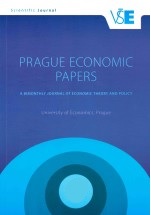Assessing the Impact of Tax Evasion on Long-Term Fiscal Imbalance: A Sensitivity Analysis Application
Assessing the Impact of Tax Evasion on Long-Term Fiscal Imbalance: A Sensitivity Analysis Application
Author(s): Lucia Mihóková, Radovan Dráb, Andrea KralikSubject(s): Economy
Published by: Vysoká škola ekonomická v Praze
Keywords: public finance; long-term fiscal imbalance; tax evasion; probabilistic sensitivity analysis; simulation; EU countries
Summary/Abstract: Tax evasion can have important consequences for the macroeconomic and social balance of a country, as well as for its monetary and fiscal development. A limited number of studies dealing with the consequences for fiscal imbalance are present, but their objectives vary a lot. This analysis has been conducted with the purpose to empirically assess the impact of the tax evasion changes on the public debt in the 28 EU countries. The research considers the dynamics of public debt during the period of 21 years. The research is based on a probabilistic sensitivity analysis approach that was conducted individually for four clusters using @Risk of Palisade Decision Tools Package. The analysis showed a negative correlation between the tax evasion and the public debt, where the growth of the tax evasion is connected with the decrease of the public debt in a given country. The extent of the effect varies depending on the country, or more precisely on the groups of countries and is conditioned by other macroeconomic variables.
Journal: Prague Economic Papers
- Issue Year: 27/2018
- Issue No: 3
- Page Range: 331-350
- Page Count: 20
- Language: English

